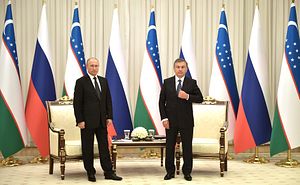Labor migration was in the spotlight as a high-level delegation from Uzbekistan visited Russia on November 6-8. The delegation was headed by Senate Chairman Nigmatilla Yuldashev. The visit was the second highest visit related to the migration issue for Uzbekistan. The first took place when Uzbek President Shavkat Mirziyoyev was hosted by his Russian counterpart Vladimir Putin in Moscow in April 2017. At that time, the presidents signed two labor migration related agreements.
The recent delegation to Russia included Uzbekistan’s first deputy minister of employment and labor relations, Erkin Muhitdinov, who led migration related discussions. When he met with Russian officials, his focus was on arrangements to set up the first multifunctional migration center of the Russian Federation in Uzbekistan. Additionally, he held negotiations on the reciprocity of work records and pension rights of migrants.
A multifunctional migration center is a semi-governmental institution for a potential labor migrant to undergo necessary procedures, such as knowledge tests, medical evaluation, and other procedures that allow applicants to receive an annual permit to work in Russia legally. The process can easily turn into an expensive and time-consuming quandary with multiple traps.
If the center becomes operational in Uzbekistan, while it will not solve all the issues migrants face to become legally employed in Russia, it will cut major bureaucratic and logistical steps for Uzbeks. The opportunity to start a legalization process in Uzbekistan will be a major relief for Russia’s largest labor migrant population. According to the latest estimates, for the first nine months of 2018, 1,573,791 people from Uzbekistan entered Russia for the purpose of work. Tajikistan, the next largest supplier of labor migrants, sent half of Uzbekistan’s amount — 790,116 people.
In addition to meeting with Russian officials, Muhitdinov met with migrants from Uzbekistan held in a special detention center for minor violations and awaiting deportation from Russia. He took interest in their conditions and extended support for speedy resolution of their cases. For the first time, Muhitdinov on behalf of official Uzbekistan committed to take financial responsibility in returning the migrants he met starting with the 170 migrants in the center he visited.
When Uzbekistan negotiates special arrangements for its migrants or any other economic matters, the process is usually far from easy. Russian officials have long wanted countries to sign up for the Eurasian Economic Union (EAEU) in order to smooth the process. As Uzbekistan has tried to stay away joining the Russian-led regional organization, delicate negotiations have been necessary. When the agreement on organized employment was signed in April 2017 by the presidents of both countries it had to be approved by Russian lawmakers, who did so only grudgingly. Populist Russian lawmakers saw no need to allow Uzbek migrants in through a special government program when their own citizens were far from receiving a similar treatment. Nevertheless, when the lawmakers eventually approved the agreement, they called it a geopolitical sacrifice.
The recent signing of the new Migration Policy Framework for 2019-2025 by Putin could also play to Uzbekistan’s advantage. The exact implementation details of the policy are still in the works, but as it reads now, it is supposed to be more inviting to labor migrants. Russian lawmakers might become more cooperative in passing arrangements beneficial to countries outside the EAEU, such as Uzbekistan, in the future.
The government of Uzbekistan is increasingly playing an active role in supporting its labor migrants. Since the change of administration, for the first time in the independent Uzbekistan, migrants have begun receiving the attention of government officials. Uzbek officials worked at negotiating special arrangements and began extending financial support to returnees. For any country these activities may seem normal, but for a country that until recently denied the existence of massive labor migration, these moves are important strides. At the same time, the burden is on Uzbekistan to receive maximum benefits from Russia, which they have to play out delicately without succumbing to pressures from Moscow to join the EAEU.

































